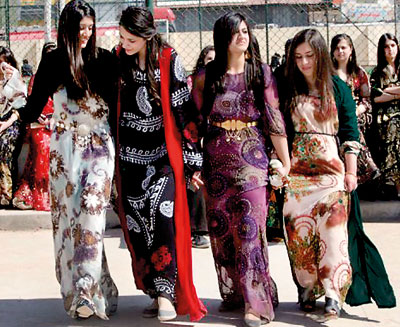Sunday Times 2
Women’s rights law no match for Kurdistan tradition
View(s):ARBIL, Iraq (AFP) In June 2011, Iraqi Kurdistan passed a landmark law that criminalised female circumcision and domestic violence, but one year on, activists remain frustrated with its patchwork implementation.�In what is a conservative society even by Middle East standards, the passage of the law last year was hailed by rights groups and NGOs as a major step forward after years of struggle.
The law punishes physical, sexual and psychological assault committed within the family, creates conditions for the protection of victims and mandates the establishment of specialised courts.

Iraqi students wearing traditional Kurdish clothing celebrate International Women's Day in Arbil, the capital of Kurdistan.
It also carries penal and financial punishments for those who promote or practise female genital mutilation.
Kurdistan benefits from a markedly more stable security situation than the rest of the country, and an improving economy, two factors that mean life for women in Kurdistan is widely regarded as better than Iraq’s other provinces.
But terrible problems remain, one of which is female genital mutilation.
Though often perceived as a problem mostly prevalent in Africa, the practice is widespread in Kurdistan, according to German NGO Wadi, which published a report in 2010 on the subject, based on interviews with 1,700 women in the region.
According to that report, 72.7% of women in the region’s two biggest provinces of Arbil and Sulaimaniyah were victims of female genital mutilation, with the rate rising to almost 100% in some areas.
Wadi pointed to a “clear link” between the practice and illiteracy, pegged at 51.1% among women in Kurdistan.
The adoption of the law marked a “big victory”, said Suzan Aref, head of the Women’s Empowerment Organisation, a local NGO established in June 2004.”At least now we are talking about this,” she said.
Pakhshan Zangana, secretary general of the High Council for Women’s Affairs, a Kurdish government agency, agrees: “In our society, just to recognise domestic violence is very important.” Society recognised that, yes, we do have domestic violence, it is a crime. This is so important.
“In other societies, it is (considered) the right of the family, that they have the right to do anything,” she said.
But both women agree the battle will not be won until the law is fully applied, which appears a long way off.
“Yes, we have laws, but… we don’t have implementation,” Aref said. “This is a big problem. “You cannot find that the numbers (for female genital mutilation) have reduced because of this law, because no one knows about it,” she said, adding: “We need a campaign of awareness.”


















